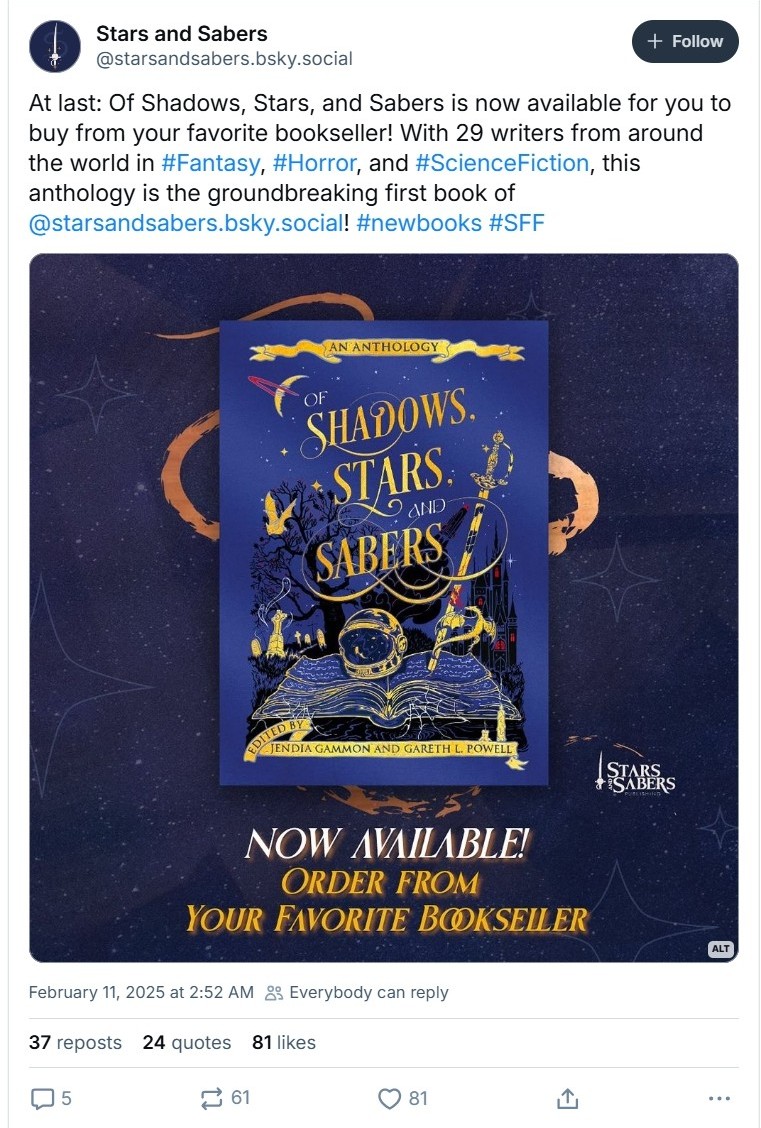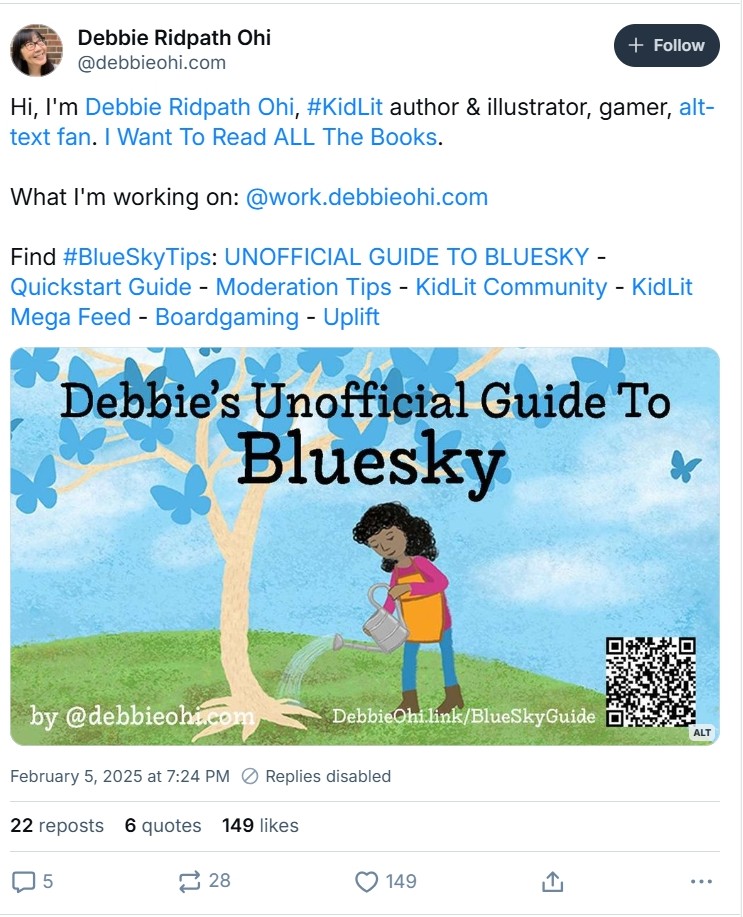For many years, authors and publishers have relied on social media to connect with readers, industry professionals, and fellow creators. But with the turbulence surrounding X (formerly Twitter), many in the independent publishing world have been searching for a new digital home. Enter Bluesky—a decentralized, user-driven platform that many in the book community are beginning to embrace.
We spoke with four publishing professionals who have made the shift to Bluesky: author-illustrator Debbie Ridpath Ohi (@debbieohi.com), author and digital strategist Brian Kirby (@boringstorybook.com), indie press representative Amy Rath of Unsung Voices Books (@unsungvoicesbooks.bsky.social), and Jendia Gammon, editor in chief of Stars and Sabers Publishing (@starsandsabers.bsky.social). Together, they provide insight into Bluesky’s strengths, challenges, and what indie publishers and authors should know before diving in.
Why Switch to Bluesky?
For many users, the decision to leave X wasn’t just about seeking an alternative—it was about finding a better platform.
“When I realized that I no longer wanted to stay on X, I tried out a bunch of new platforms,” Ridpath Ohi says. “I ended up settling on Bluesky because it had the most curation and moderation tools, the interface was enough like X that I figured the onboarding process would be easier for those familiar with X, and I thought it had the most potential for attracting the kidlit community.”
For Kirby, Bluesky’s usability was the main draw. “The platform empowers the user and fosters conversation over content broadcasting and is not actively using my illustrations to train a generative AI model, making Bluesky the best Twitter alternative I’ve tried.”
Meanwhile, Rath found Bluesky appealing because of its community-focused approach. “What initially drew us to Bluesky was that it seemed to have a broad enough base of users that you could discover a wide audience, but there was still plenty of opportunity to create your own community.”

A Bluesky post from Stars and Sabers Publishing.
What Makes Bluesky Different?
Unlike X, where engagement is often driven by algorithms, Bluesky operates on a more organic, user-controlled model. This fundamental difference can be an adjustment for those used to the engagement mechanics of mainstream platforms.
“There is no black-box algorithm,” Ridpath Ohi says. “I keep seeing newcomers used to getting lots of engagement on X posting exactly the same way on Bluesky, then getting frustrated.” She cites Brian LaRossa, Scholastic art director (@brianlarossa.com), who explains, “There is no baseline algorithm at work here, clamoring for your attention. This is a grocery store, not a restaurant. If you came here because you don’t want other people messing with your feed, you need to learn to cook.”
Bluesky’s decentralized nature also means that users must take a more proactive approach to engagement. “Bluesky’s biggest advantage is user control,” Kirby says. “Unlike algorithm-driven platforms, it lets you
shape your own experience by exploring feeds, lists, and filters. While this requires some effort, it restores the user-first approach that social media once offered.”
Challenges and Considerations
While Bluesky offers a refreshing alternative to X, it does require more effort to build a following and maintain engagement.
“As with anything, you get out the effort that you put in,” Rath says. “Plus, the decentralized platform—which we believe is a benefit—means that it takes more effort to discover what else is on Bluesky.”
Kirby echoes this sentiment: “It requires real engagement—it’s not just about posting, but being present. Building a community takes time. Larger publishers with a budget should think about investing in a dedicated brand personality, not just rely on a rigid posting schedule that pushes announcements without real interaction. The same goes for authors. Engage genuinely. Share and comment on others’ posts with a positive presence.”
“Bluesky still does not yet have the reach of more established social media apps,” says Gammon, “but that has been improving as social media users look to alternatives. Some of the features that were expected of other apps are slowly being added on. Just be aware that it is a good idea not to have ‘all your eggs in one basket’ when it comes to social media.”
Discoverability can also be a challenge for those new to the platform. “Instead of just broadcasting and expecting people to respond, take the time to connect with the community,” Ridpath Ohi says. “Seek out other indie authors and small press publishers. Look for individuals and publishers you’re familiar with on X, then scroll through their follow lists to find others.”
“I think it’s very hard to get discoverability on any social media app, and Bluesky is no exception,” Gammon says. “Starting over on a new app means there’s a learning curve, but the long tail of it is that you have to start from scratch trying to find the audience you want.”

A Bluesky post from author-illustrator Debbie Ridpath Ohi that offers a guide to the platform.
Engagement and Community-Building
Despite its growing pains, Bluesky offers a vibrant and engaged community for those willing to invest in it. “Engagement on Bluesky is remarkably high for a platform with purely organic reach (for now),” Kirby says. “Hashtag use is abundant. #amwriting, #writingcommunity, #amquerying, etc. Check out events like #kidlitchat, a Tuesday night meetup where kidlit topics often take delightful detours into pie recipes. Scholastic art director Brian LaRossa frequently posts calls for illustrators. Victoria Strauss is a great resource for reporting on book scams.”
The ability to create Starter Packs—a feature unique to Bluesky—can also help users quickly establish connections. “My favorite feature is the ability to create Starter Packs, which can be shared publicly, where you are able to group together multiple users based on an interest or topic,” Rath says. “For example, we started one for indie publishers, and as an author, you can very easily establish one for IndieRomanceWriters, for example.” Kirby has also collaborated with Ridpath Ohi and illustrator Charlene Chua to create the KIDLIT MEGA FEED, an aggregated feed where users can connect with meaningful publishing-related content. “It shows a timeline where users can connect with meaningful content without the interference of bots, trolls, or spam,” he says.
How Indie Authors Are Promoting Their Work
Bluesky’s lack of paid promotions means that marketing strategies must be more community-driven. “I treat book promotion on Bluesky the same way I’ve always done on other social media platforms,” Ridpath Ohi says. “I focus more on connecting with the kidlit community than on the hard sell. Instead, I look for ways to authentically connect with educators, librarians, book bloggers, booksellers, and other book creators.”
Kirby agrees: “I’ve seen book birthday announcements, creative giveaways, school visit recaps, process videos, and launch groups forming lists and starter packs to support each other. While Bluesky doesn’t have built-in, cookie-cutter, or paid promotion tools, the kidlit community—authors, illustrators, agents, booksellers, and publishers—is finding organic ways to connect and share their work.”
Advice for Indie Authors and Publishers Getting Started on Bluesky
For those considering joining Bluesky, our experts offer the following tips:
- Complete your profile – “Make sure your profile is complete,” Kirby says. “A picture, a bio, and an active timeline are essential—no one follows a blank account with a default avatar.”
- Engage, don’t just broadcast – “Listen first, present yourself well, and then share what makes you unique,” Kirby says. “It’s entirely up to you how well your work is received by others.”
- Use starter packs and hashtags – “Since discoverability can be a bit more challenging, anything you can do to create or feed into a community will help others,” Rath suggests.
- Share, don’t just sell – “Bluesky is small enough that it’s easy to find out if a user is not being genuine,” Rath says. “There is no reason to be anything other than your authentic self.”
Final Thoughts
Bluesky represents a new frontier for indie authors and publishers—one that offers control, meaningful engagement, and an algorithm-free experience. But success on the platform requires effort, authenticity, and a willingness to build relationships.
“The platform is its people, free from an algorithmic agenda,” Kirby says. “With so many creatives and publishing pros rebuilding their presence from the ground up and learning from past platform mistakes, many in the community on Bluesky, as I have experienced it, embrace the philosophy that a rising tide lifts all boats. There’s a real sense of pride in the space they’re creating.”
Alexa Schlosser is the managing editor of IBPA Independent magazine. If there’s a hot topic within the indie publishing world you think we should be covering, email her at alexa@ibpa-online.org.